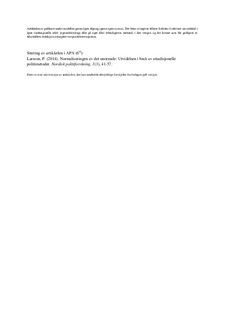Normaliseringen av det unormale : utvidelsen i bruk av utradisjonelle politimetoder
| dc.contributor.author | Larsson, Paul | |
| dc.date.accessioned | 2014-09-16T07:45:15Z | |
| dc.date.available | 2014-09-16T07:45:15Z | |
| dc.date.issued | 2014 | |
| dc.identifier.issn | 1894-8693 | |
| dc.identifier.uri | http://hdl.handle.net/11250/219795 | |
| dc.description | Dette er siste tekstversjon av artikkelen, den kan inneholde ubetydelige forskjeller fra forlagets pdf-versjon. | nb_NO |
| dc.description.abstract | This article deals with some aspects concerning the use of police methods known under many names. These methods is often said to be new, even if most of them have a long history, as untraditional or extraordinary, hidden, secret and deceptive methods of intelligence, investigation, surveillance or even crime prevention. The main questions analyzed in the text is how does these methods affect policing and the police role in modern societies. What do we know about the effects of these methods, not only on crime, but also on the society and the justice system? The challenges and necessity in relation to research and scientific knowledge on secrete and deceptive methods are raised in the last sections of article. «What once occurred infrequently and was viewed with disdain as a characteristic pf continental despotism is now routine administrative practice.» (Fijnaut og Marx, 1995 s. 14) | nb_NO |
| dc.language.iso | nob | nb_NO |
| dc.publisher | Universitetsforlaget | nb_NO |
| dc.subject | politimetoder | nb_NO |
| dc.subject | utradisjonelle etterforskningsmetoder | nb_NO |
| dc.subject | polisiær virksomhet | nb_NO |
| dc.subject | samfunnsmessige konsekvenser | nb_NO |
| dc.title | Normaliseringen av det unormale : utvidelsen i bruk av utradisjonelle politimetoder | nb_NO |
| dc.type | Journal article | nb_NO |
| dc.source.pagenumber | 41-57 | nb_NO |
| dc.source.volume | 1 | nb_NO |
| dc.source.journal | Nordisk politiforskning | nb_NO |
| dc.source.issue | 1 | nb_NO |
Tilhørende fil(er)
Denne innførselen finnes i følgende samling(er)
-
Artikler [44]
